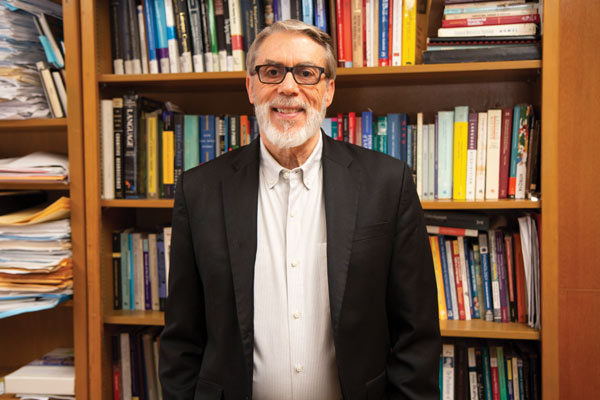From Akkadian and Arabic to Yiddish and Yoruba: The University of Texas at Austin offers courses in dozens of world languages. But why does language learning matter? In today’s world of industry, science and politics, can’t people get by with knowing just English?
The answer is simple: If all you want to do is get by, then you might be content to be a monolingual English speaker. If, on the other hand, you want to get ahead — if you want to have a competitive advantage in your career, if you want to understand and communicate with people who are not like you (and who may turn out to be your rivals or your allies), if you want to participate in a community that reaches beyond the Forty Acres — then you should know more than one language.
Language learning confers cognitive benefits that tangibly connect to career advantages. For example, compared with monolinguals, multilinguals excel in attentional control, problem solving, abstract reasoning, analytic thinking, understanding math and perspective taking. Employers recognize that skills in these domains translate into superior performance in the workplace. Little wonder, then, that in U.S. companies and government agencies, employees who can put knowledge of world languages to use in their jobs receive significantly higher salaries than those who speak only English. Demand for multilingual employees is steadily increasing and is often unmet, with the result that some U.S. employers are experiencing a “language skills gap” that results in lost business opportunities.

For us as a nation, the language skills gap is consequential. As U.S. companies expand in the international arena, their “English-only” employees find themselves competing with speakers of more than one language. Our country is at a strategic economic disadvantage worldwide when more than 60% of adults in the European Union know multiple languages, while only 20% of the U.S. workforce can claim multilingual competence on their résumés.
For students at this university, opportunities and resources abound for closing the language skills gap. In addition to learning languages on campus, students can take advantage of our extensive education abroad network. Each year, more than 4,400 UT students participate in some 400 education abroad programs in 103 countries.
Language learning and résumé building converge on internships abroad. UT students can select from internship opportunities in more than 100 programs worldwide. As with study abroad, UT internships carry course credits, and stipends and scholarships are available for qualified students. For example, the Freeman Scholars Program supports both undergraduate and graduate student internships in East and Southeast Asia, and the Department of French and Italian offers generous competitive scholarships for French majors who intern on the Institute for Field Education programs in Paris, Strasbourg and Brussels.
Demand for multilingual employees is steadily increasing and is often unmet, with the result that some U.S. employers are experiencing a “language skills gap” that results in lost business opportunities.
The most compelling endorsements of the career advantages of learning world languages come from UT alumni. For example, Juhie Modie, class of 2015, was a Rome Study Program participant and the recipient of a Foreign Language and Area Studies fellowship to further her study of Italian. Now a technical recruiter for Google in Austin, Modie writes: “In an increasingly globalized workforce, I find that my experience in Italian language studies gives me an edge because it demonstrates my ability to focus on learning a subject for multiple years, my passion for relating to people of different backgrounds, and my adaptability to different environments. I feel that without my background in Italian studies, I would not be where I am today.”
Keep in mind that the greater your linguistic skills, the greater your chances of career success. Attaining high proficiency in a world language requires time and practice, so consider beginning or building upon your language studies during your freshman year at UT. Getting ahead means getting a head start!
David Birdsong is a professor and chair in the Department of French and Italian. He serves as co-chair of the college’s World Languages Task Force. His article “Ultimate attainment in second language acquisition” was included in the Linguistic Society of America’s Best of Language: Volume III, which is made up of the 20 most outstanding articles appearing in Language between 1986 and 2016.
GLOBAL TEXAS
Find programs and learn more about course credit transfer with on-time graduation.
CAREER SERVICES
Learn the career advantages of speaking multiple languages and being cross-culturally competent.
https://liberalarts.utexas.edu/lacs/students/search/international/introduction.php
